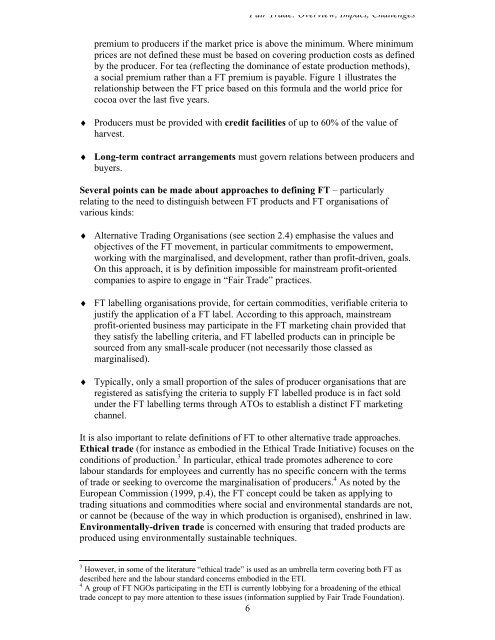Fair Trade: Overview, Impact, Challenges - Are you looking for one ...
Fair Trade: Overview, Impact, Challenges - Are you looking for one ...
Fair Trade: Overview, Impact, Challenges - Are you looking for one ...
Create successful ePaper yourself
Turn your PDF publications into a flip-book with our unique Google optimized e-Paper software.
<strong>Fair</strong> <strong>Trade</strong>: <strong>Overview</strong>, <strong>Impact</strong>, <strong>Challenges</strong><br />
premium to producers if the market price is above the minimum. Where minimum<br />
prices are not defined these must be based on covering production costs as defined<br />
by the producer. For tea (reflecting the dominance of estate production methods),<br />
a social premium rather than a FT premium is payable. Figure 1 illustrates the<br />
relationship between the FT price based on this <strong>for</strong>mula and the world price <strong>for</strong><br />
cocoa over the last five years.<br />
♦ Producers must be provided with credit facilities of up to 60% of the value of<br />
harvest.<br />
♦ Long-term contract arrangements must govern relations between producers and<br />
buyers.<br />
Several points can be made about approaches to defining FT – particularly<br />
relating to the need to distinguish between FT products and FT organisations of<br />
various kinds:<br />
♦ Alternative Trading Organisations (see section 2.4) emphasise the values and<br />
objectives of the FT movement, in particular commitments to empowerment,<br />
working with the marginalised, and development, rather than profit-driven, goals.<br />
On this approach, it is by definition impossible <strong>for</strong> mainstream profit-oriented<br />
companies to aspire to engage in “<strong>Fair</strong> <strong>Trade</strong>” practices.<br />
♦ FT labelling organisations provide, <strong>for</strong> certain commodities, verifiable criteria to<br />
justify the application of a FT label. According to this approach, mainstream<br />
profit-oriented business may participate in the FT marketing chain provided that<br />
they satisfy the labelling criteria, and FT labelled products can in principle be<br />
sourced from any small-scale producer (not necessarily those classed as<br />
marginalised).<br />
♦ Typically, only a small proportion of the sales of producer organisations that are<br />
registered as satisfying the criteria to supply FT labelled produce is in fact sold<br />
under the FT labelling terms through ATOs to establish a distinct FT marketing<br />
channel.<br />
It is also important to relate definitions of FT to other alternative trade approaches.<br />
Ethical trade (<strong>for</strong> instance as embodied in the Ethical <strong>Trade</strong> Initiative) focuses on the<br />
conditions of production. 3 In particular, ethical trade promotes adherence to core<br />
labour standards <strong>for</strong> employees and currently has no specific concern with the terms<br />
of trade or seeking to overcome the marginalisation of producers. 4 As noted by the<br />
European Commission (1999, p.4), the FT concept could be taken as applying to<br />
trading situations and commodities where social and environmental standards are not,<br />
or cannot be (because of the way in which production is organised), enshrined in law.<br />
Environmentally-driven trade is concerned with ensuring that traded products are<br />
produced using environmentally sustainable techniques.<br />
3<br />
However, in some of the literature “ethical trade” is used as an umbrella term covering both FT as<br />
described here and the labour standard concerns embodied in the ETI.<br />
4<br />
A group of FT NGOs participating in the ETI is currently lobbying <strong>for</strong> a broadening of the ethical<br />
trade concept to pay more attention to these issues (in<strong>for</strong>mation supplied by <strong>Fair</strong> <strong>Trade</strong> Foundation).<br />
6
















![CynefinFramework final [Read-Only]](https://img.yumpu.com/19017304/1/190x135/cynefinframework-final-read-only.jpg?quality=85)